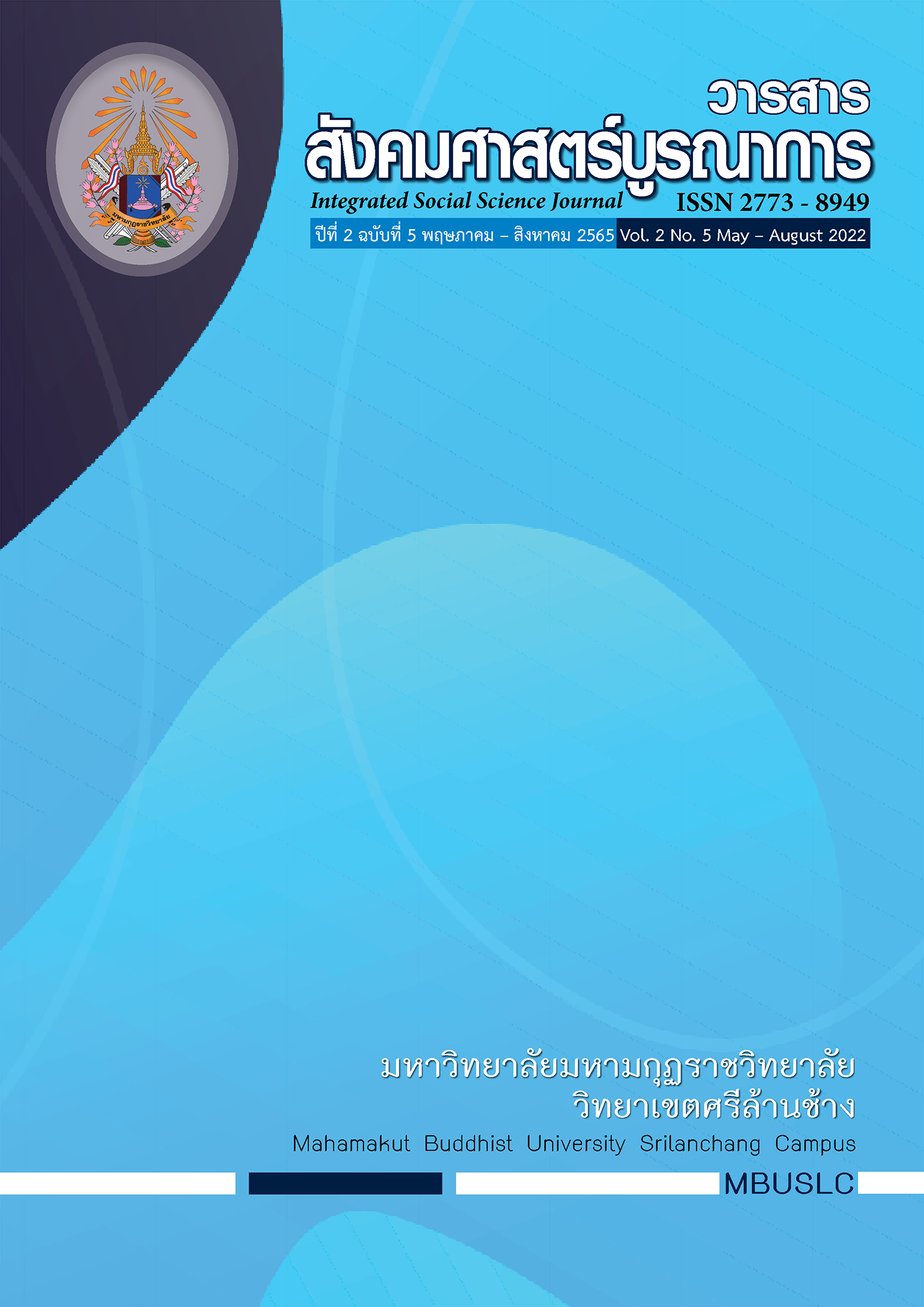GAME-BASED LEARNING OF ENGLISH VOCABULARIES FOR MATHAYOMSUKSA 1 STUDENTS OF LUANG PU SRICHAN VANNABHO CHARITY SCHOOL, LOEI PROVINCE
Main Article Content
Abstract
The objectives of the research were (1) to study the efficiency of game-based learning of English vocabularies, (2) to compare the students’ achievement of English vocabulary learning before and after the game-based learning, and (3) to study the Mathayomsuksa 1 students’ satisfaction with game-based learning of English vocabularies. The target group was a total of 27 Mathayomsuksa 1 students of Luang Pu Srichan Vannabho Charity School, Loei Province. The instruments used for data collection consisted of a lesson plan on Game-Based Learning of English Vocabularies, tests on English vocabulary learning, and the survey of the students’ satisfaction. The statistics used for data analysis comprised arithmetic mean, standard deviation and the t-test for dependent samples.
The research results of this study show that: 1) the efficiency of English vocabulary learning lessons using games in class for secondary 1 students was at 70.08/85.17, higher than the standard of 70/70, 2) the achievement of learning English vocabulary with games was higher, them the pre-test at 0.01 level significant and the percentage of progress was 25.08, and 3) the students were satisfied with learning English vocabulary using games, at a high level, the highest percentage was that they understand and enjoyed learning English vocabulary better.
Article Details

This work is licensed under a Creative Commons Attribution-NonCommercial-NoDerivatives 4.0 International License.
บทความที่ได้รับการพิจารณาจากคณะกรรมการผู้ทรงคุณวุฒิและเผยแผ่ในวารสารฉบับนี้ เป็นทัศนคติและข้อคิดเห็นส่วนบุคคลของผู้เขียนแต่ละท่าน ไม่ถือว่าเป็นทัศนะคติและความรับผิดชอบ
ของบรรณาธิการ
บทความ ข้อมูล เนื้อหา รูปภาพ ฯลฯ ที่ได้รับการตีพิมพ์ในวารสารสังคมศาสตร์บูรณาการ ถือเป็นลิขสิทธิ์ของวารสารสังคมศาสตร์บูรณาการ หากบุคคลหรือหน่วยงานใดต้องการนำทั้งหมดหรือส่วนหนึ่งส่วนใดไปเผยแพร่ต่อหรือเพื่อกระทำการใด ๆ จะต้องได้รับอนุญาตเป็นลายลักอักษรจากวารสารสังคมศาสตร์บูรณาการ ก่อนเท่านั้น
References
กรมวิชาการ. (2551). กระบวนการเรียนรู้และยุทธศาสตร์การเรียนรู้. กรุงเทพมหานคร: เดอะมาสเตอร์กรุ๊ปแมนเนจเม้นท์ จากัด.
จริยาพร ศรีพิทักษ์พลรบ และรุ่งทิพย์ ดำจ่าง. (2551). การเปรียบเทียบผลสัมฤทธิ์การเรียนรู้คำศัพท์ภาษาอังกฤษของนักเรียนชั้นประถมศึกษาปีที่ 4 ที่สอนโดยใช้เกมประกอบและสอนตามคู่มือครู. การค้นคว้าอิสระศิลปศาสตรมหาบัณฑิต สาขาวิชาภาษาอังกฤษ มหาวิทยาลัยนเรศวร.
ณัฐวราพร เปลี่ยนปราณ และสุทัศน์ นาคจั่น (2558). การเรียนรู้คำศัพท์ภาษาอังกฤษโดยใช้เกมประกอบการสอนของนักเรียนชั้นประถมศึกษาปีที่ 6 โรงเรียนวัดทุ่งน้อย อำเภอกุยบุรี จังหวัดประจวบคีรีขัน. Veridian E-Journal, Silpakorn University (Humanities, Social Sciences and arts) ฉบับภาษาไทย ปีที่ 8 ฉบับที่ 2 เดือนพฤษภาคม – สิงหาคม 2558, หน้า 1672 – 1684.
สุภาษิต พาณยง. (2555). การพัฒนาทักษะการอ่านและการเขียนภาษาอังกฤษโดยใช้เกมการศึกษา สำหรับนักเรียนชั้นประถมศึกษาปีที่ 2 โรงเรียนสวนรัฐวิทยา กรุงเทพมหานคร. วิทยานิพนธ์ศึกษาศาสตรมหาบัณฑิต สาขาหลักสูตรและการสอน มหาวิทยาลัยสุโขทัยธรรมาธิราช.
Krashen, S. D. & Terrel, T. D. (1983). The Natural Approach. Oxford: Pergamon Press.
McCarthy, B. (1997). A tale of four learner: 4 MAT learning styles. Eric Accession: NISC Discover Report, 46-51.

